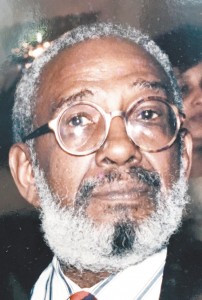Noted civil rights attorney, Lolis E. Elie, dies
10th April 2017 · 0 Comments
By Michael Patrick Welch
Contributing Writer
Local and national Civil Rights attorney and hero Lolis Elie passed away on Tuesday afternoon, April 4, at his home in Treme. He was 87.
Elie first left New Orleans, after high school, as a merchant seaman, ending up for a time in New York City. Later drafted into the army, he served as a clerk in California. Elie attended Howard University then transferred back home to Dillard before finally receiving his law degree from Loyola University in 1959. He went on to co-found the New Orleans law firm of Collins, Douglas and Elie (with Nils Douglas and Robert Collins), a powerhouse of the Civil Rights Movement that forced racial progress both locally and nationally.
“He is so much a part of the progress that we have made as a city, state and country, coming from the places we were,” retired Judge Calvin Johnson stated.
Elie and his colleagues are well-known for having represented the New Orleans chapter of the Congress of Racial Equality (CORE) after the group’s sit-in campaign in 1960. Four protestors, nicknamed the “CORE Four,” were arrested after a sit-in at the all-white lunch counter inside a Canal Street shop. The students faced 10 years in prison each, charged with criminal anarchy. But in 1963, Elie, his partners, and a coalition that included CORE, the Consumer’s League and the NAACP, saw that the high court dismiss the arrests. The courts also declared the city’s ban on sit-ins unconstitutional, helping to pave the way for national sit-ins.
“Collins, Douglas, and Elie became the most noteworthy firm in Louisiana for racial equality and played a key role in the integration of New Orleans,” said Rep. Cedric Richmond (LA-02) in a statement on Elie’s passing.
“Elie represented the best of who we are, and pushed Louisiana and the nation to reach that standard,” stated Rep. Richmond. “We all have him to thank for how far we have risen since the day he first joined a picket line and for the heights we will reach in the future.”
Following Elie and company’s success desegregating lunch counters, the coalition went to work procuring jobs “above the menial level for Black employees.” On Dryades Street, he commanded a successful boycott, and then went to work on Canal.
“A request by this committee for a report on job availability promised in initial negotiations by the Canal Street merchants has been ignored for the past nine months,” read a 1963 letter from Elie. “Therefore, it may be accurately reported that negotiations have now ended and the representative organizations have deemed it mandatory to renew the ‘selective buying campaign’ of a year ago… The Canal Street merchants have seen fit, for whatever reason, to ignore the reasonable request of representatives of our population. They view, it is believed, the Negro population as one too weak to stand together and too apathetic to try. It has been demonstrated in New Orleans that this is false.”
Elie’s letter ended, “Destroy the image of being a pacified Negro.”
The Greater New Orleans Louis A. Martinet Legal Society released this statement regarding Elie’s passing:
“The members of the Greater New Orleans Louis A. Martinet Legal Society are saddened by the loss of legendary civil rights attorney and activist, Lolis Edward Elie. Mr. Elie spent his entire legal career challenging racial injustice and social inequity. As a pioneer in the legal community, his sacrifices were central to advancing many of the civil rights we enjoy today. His unique life and legacy will continue to serve as a beacon for this organization, as well as an enduring reminder to current and future generations of African-American lawyers and civil rights activists, that balancing justice and effecting change is just as important now than ever before. He will be sorely missed.”
“He was certainly my mentor and teacher,” said Ernest L. Jones, Elie’s last law partner.
Jones and Elie joined in partnership in the mid- to late 90s forming Elie & Jones, and remained so until Hurricane Katrina. It was after Katrina that Elie stepped away from practicing law. The law firm continues to operate.
Jones said it was Elie who stepped up to the plate when Jones, who was fairly new to the city and had only graduated from law school in 1969, took the Black Panther Party of New Orleans as clients and asked the seasoned Black attorneys of the city for assistance. “Lolis was the only person to step up,” Jones said. He says that Elie’s counsel was immeasurable.
Jones also said that Elie, along with his law partners of the late Nils Douglas and Judge Robert Collins, made history as they became the first African-American law firm to have offices in downtown New Orleans, creating a model for every Black law firm since.
“No one thought before that, that a Black firm could do that and survive,” Jones said.
He said, that while individuals worked downtown, the thought that a Black law firm could hang up a shingle in Downtown New Orleans was unthinkable and because they did it and were successful at it, that it will “forever remain part of the history of New Orleans.”
Fourth Circuit Court of Appeals Judge Ed Lombard hailed Elie as a friend and mentor throughout the years and described Elie as “a giant in the legal profession.”
“I knew him for over 50 years. He was a friend of my family and a mentor to me. His contributions to civil rights are legendary and will not be forgotten,” Lombard said.
This article originally published in the April 10, 2017 print edition of The Louisiana Weekly newspaper.




